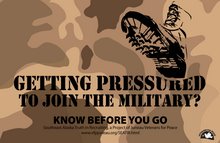MIAMI — Every morning before school starts, Miles Woolley, a drafting teacher at Southwest Miami High School, gets a reminder of military life when the Junior R.O.T.C. honor guard marches by his classroom.
“Their marching and parading around in uniforms stirs bad memories in me,” he said.
Mr. Woolley, 61, is a Vietnam veteran whose service left him with a bullet in his head, a mostly useless left hand and a dragging left foot. He was drafted at age 19, not much older than his students are now, and transformed from a small-town newlywed into a fast-shooting reconnaissance soldier.
The prospect that his students might follow that path haunts him.
Southwest Miami High is a sprawling but orderly place that offers a wide range of classes, including cosmetology, auto shop and Advanced Placement calculus, to 2,800 students, most of whom are Hispanic and from low-income families.
Like many such high schools, it is also a focus for military recruiting. Hundreds of students take the Armed Services Vocational Aptitude Battery, or Asvab, test each year. More than 100 are enrolled in the Army J.R.O.T.C., drilling, marching and using dummy guns. And every Tuesday and Wednesday, recruiters from the Army, Navy and Marines set up tables in the lobby outside the cafeteria, handing out water bottles, key chains and stickers and talking up the benefits of a military career.
“There’s a lot of student interest,” said Sgt. Juan Montoya, an Army recruiter who visits the school and calls students’ homes. “The big obstacle is the parents, who think we’re going to send their kids off into combat.”
Mr. Woolley avoids the lobby. Read article

